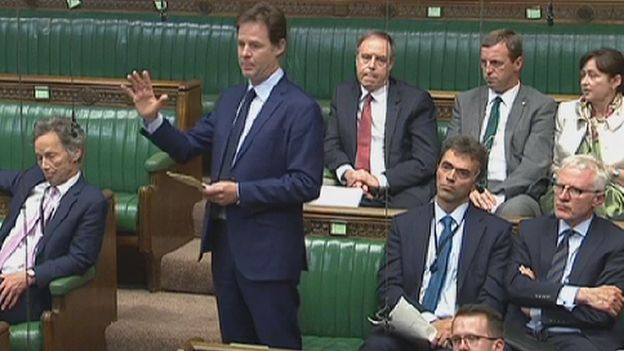Queen's Speech 2015: Nick Clegg attacks new Tory government
- Published

Nick Clegg has accused the new Tory government of abandoning the values he said had been at the coalition's core.
He said it was "dispiriting if pretty unsurprising" to see David Cameron's government turn their back on the coalition's "liberal stance".
The former deputy prime minister also criticised his former partners' "swagger" over the EU referendum.
And, in his final speech to MPs as Lib Dem leader, he predicted the EU debate would "devour" Mr Cameron's party.
A contest to replace Mr Clegg is under way after the election left his party with just eight MPs.
"My party's presence may be much, much reduced in size, but our mission is clearer than ever," said Mr Clegg.
He said new data monitoring powers, resisted by his party in government, represented a "turbo charged snooper's charter", and said there had not been enough to support social care and house-building.
He accused the Conservatives of ditching their commitment to civil liberties.
"The human rights we hold dear, our right to privacy in an online age, our future as an open-minded, outward-looking country, are all hanging in the balance again because of the measures announced today," he said.
"The previous coalition government's commitment to fairness is weakened," he added.
Mr Clegg said he sensed "a slight swagger" among the Conservatives over Mr Cameron's bid to repatriate powers from the EU, saying the PM was "ambivalent" towards the UK's place in Europe.
And he called for electoral reform and wholesale changes to Britain's constitution, adding: "This sort of piecemeal tinkering does not go nearly far enough."
He began his speech, in a half empty chamber, by saying it was "an unaccustomed surprise" to speak in the Commons without being greeted by a "disobliging wall of noise" from the opposition benches.
Following the Lib Dem leader in the Commons, Conservative MP Andrew Mitchell said history would treat Mr Clegg's time as deputy prime minister more kindly than the electorate had.
- Published27 May 2015
- Published27 May 2015